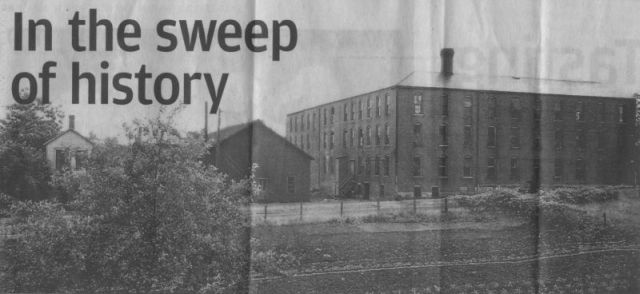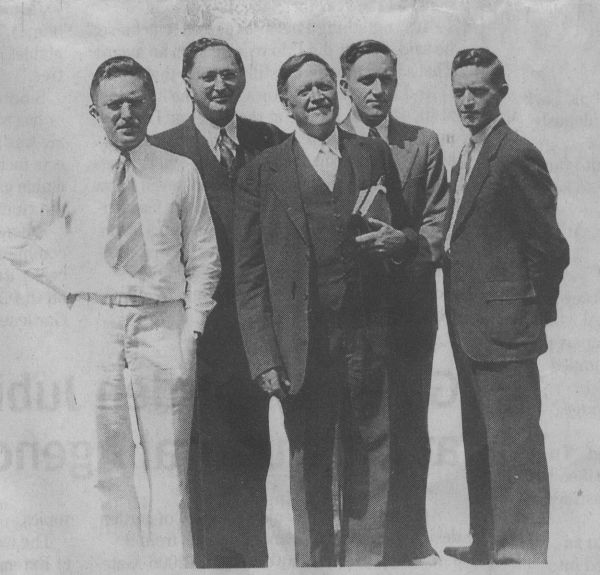
Located at Russell and Gwynne streets in Urbana, this building housed the Perry, Perry & White and, finally, the Whlte-Valentine Co., all of which made brooms. Built about 1883, the plant was closed in 1925 and subsequently demolished. Courtesy of the Champaign County Historical Society
The Rev. Charles Carey made brooms to help make ends meet.
By Tom Stafford
Staff Writer
To Marvin Carey, memories of his Quaker preacher father and "the greatest man I ever knew" are as closely wrapped as broom corn gathered and stitched into place around a stick.
"Preaching always came first to him, then farming, then making brooms, I guess," Mr. Carey said.
If that seems rather an odd trinity, the world of a century ago was a very different place.
On the prairie
Mr. Carey, a long retired school principal who at 93 is living on Springfield's northeast side, said that before he was born, the Rev. Charles Carey farmed at a place northeast of Urbana called Pretty Prairie.
He must have been a tenant farmer who worked family land "because he never had enough money to rent a farm," Mr. Carey said.
"I wouldn't be surprised if he had some broom corn on that farm," Mr. Carey said.
Histories of Urbana's broom industry (see story at right) indicate the prairie sections of the county are where broom corn, a variety of sorghum, was raised.
It was the way the Rev. Carey raised Marvin, the youngest of five children, four boys and a girl, that most endeared his youngest son to him.
"I was 18 days old when my mother died," he said. Charles later married a widow with a daughter "because he was in the ministry and felt he needed a helpmate," Mr. Carey said.
Despite a busy life, the Rev. Carey never neglected his duties as a father.
Marvin remembers going hunting and fishing along Mad River north of Urbana and being taken out to gather sassafras and chestnuts.
"My dad, he taught me how to set a trap -- and all the stuff that fathers are supposed to do."
It was because fathers are supposed to provide financial support for their children that Charles Carey supplemented his slender preacher's salary by making brooms.
Two shades of red
Mr. Carey's first memory of his father's broom making dates to the Urbana of the World War I, where, as a child, he witnessed a display that depicted Kaiser Wilhelm, the German leader, as the devil himself.
The broom shop he recalls on Urbana's north side was painted a more beautiful red than the Kaiser's costume and had a floor Mr. Carey says had a perpetual shine from the oil left on it by fallen kernels and the buffing done by regular sweepings.
Said Mr. Carey, "It was cleaner than clean ought to be."
The owner "was either Fruehof or Freyhof," Mr. Carey said. (The Urbana City Directories of the time lists Freyhofs.) "They did all their work by hand."
And when his father took the family to preaching positions at Bellefontaine and Zanesfield and then eventually in Mount Pleasant, near Steubenville, he did his own work by hand, too.
B.V. (Before Vacuums)
"We moved down to Eastern Ohio in 1924, and, some way or other, he got hold of a piece of bioom corn machinery," Mr. Carey said.
The machine was kept in a garage on the property, the supplies brought in from Urbana.
"I can remember him out there in the winter-time making brooms," he said.
Although he remembers it sketchily, Mr. Carey said the process began with a handle being locked in a set of jaws and a fist full of broom corn tassel being tightly wrapped around it.
"He'd cut off here, cut off there, depending on what kind of a broom he was making. I think he could make a broom in about an hour and a half. And then he'd do it again."
Although it probably happened with other brothers as well, Mr. Carey remembers his brother Herbert and a friend "used to load up this Model T with brooms" and go door-to-door selling brooms to farmers, an experience that gave Herbert a lifelong fear of dogs.
Eventually Mr. Carey, as the youngest, took over the sales.
"A lady across the street bought the first one," he said. "You'd just go up and down the street, and you could sell half a dozen of them.
"Everybody needed a broom. I don't think they had vacuum cleaners then," he said.
He estimates the cost in the mid-1920s as having been a quarter and said, "I probably got a nickel" from each sale.
About the Miss Daisy
After he graduated from high school in Mount Pleasant in 1932, Mr. Carey moved with the family to Springfield, where his father started a Society of Friends church on McCreight Avenue.
With the help of a paint brush, Wittenberg College's policy of allowing ministers' children to pay $60 a quarter instead of $120, and some donations from Elizabeth Tipton at a downtown bank, Carey earned a two-year teaching degree in 1935 and took his first job teaching 54 students at Springfield's Southern School on the current site of South High School's Tiffany Gym.
After serving in the Navy during World War II, he earned a bachelor'a degree from Wittenberg in 1947,1 and continued his administrative career, retiring from Simon Kenton School in 1972.
"I can remember one broom," he added toward interview's end, "it was called Little Miss Daisy. That was my mother's name."
Did his father name the broom? Did Mr. Freyhof name it in honor of his friend's late wife? Or was the name merely happenstance?
Mr. Carey can't say. Along with so many things from the days of broom corn, it has been lost in the sweep of history.

The Rev. Charles Carey, center, made brooms to help ends meet and had his boys sell them. From left are sons Herbert, Kenneth, WiIford2 and Marvin. Courtesy of Marvin Carey
2 Marvin reminds us that his brother's name was Milford.